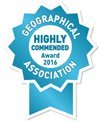A Level subject content overviews
To support teachers with the introduction of the 2016 A Level courses, the Society is providing a new range of online resources and support.
The following overview document provides an introduction for teachers to some of the key content, concepts and geographical theories within the new A Levels and will be particularly useful for colleagues who have not previously taught elements of the new content.
These have been written by leading academic geographers, a number of whom were members of the ALCAB subject advisory panel for geography.
There is particularly focus on the areas of core content.
Geographers share an interest in places and the ways in which they are changing: our high streets with their changing mixes of businesses and public spaces, for example, and residential neighbourhoods, churned by waves of migration. To understand urban and rural places such as these and the processes they illuminate, it will be helpful to develop a more general understanding of place. So, as Stephen Daniels has observed, ‘it is not just that specific places are being studied, but the very idea of place’ (Daniels 1992, p.310). The following identifies some of the key theoretical concepts and perspectives that geographers use to identify, research and better understand the geographical nature of places.
In the Changing Places section of A Level Geography, the concept of place significantly progresses upon GCSE understandings of this term, while it anticipates those in higher education, benefiting those who will go on to study geography at university. At GCSE level, place is understood as locality, a geographical scale somewhere between the home and the region. At A Level, a more complex picture of place emerges. There are two aspects to this. First, place is understood as a geographical nexus of connections and linkages including flows of people, ideas, information, wealth and things, which come together in and define a geographical location or locality. Since these flows reach from the local to the global, place is not simply a synonym for locality, or the opposite of the global. A Level students will study place through at least two localities – one where they live, and one or more contrasting locations. Through these localities, they will have understood how place exists in and through its wider linkages and relationships, which assume economic, political and other forms.
Download the full A Level Subject Content Overview document from the downloads box.
 |
This set of 6 resources won a Geographical Association Publishers' Highly Commended Award in 2016 |